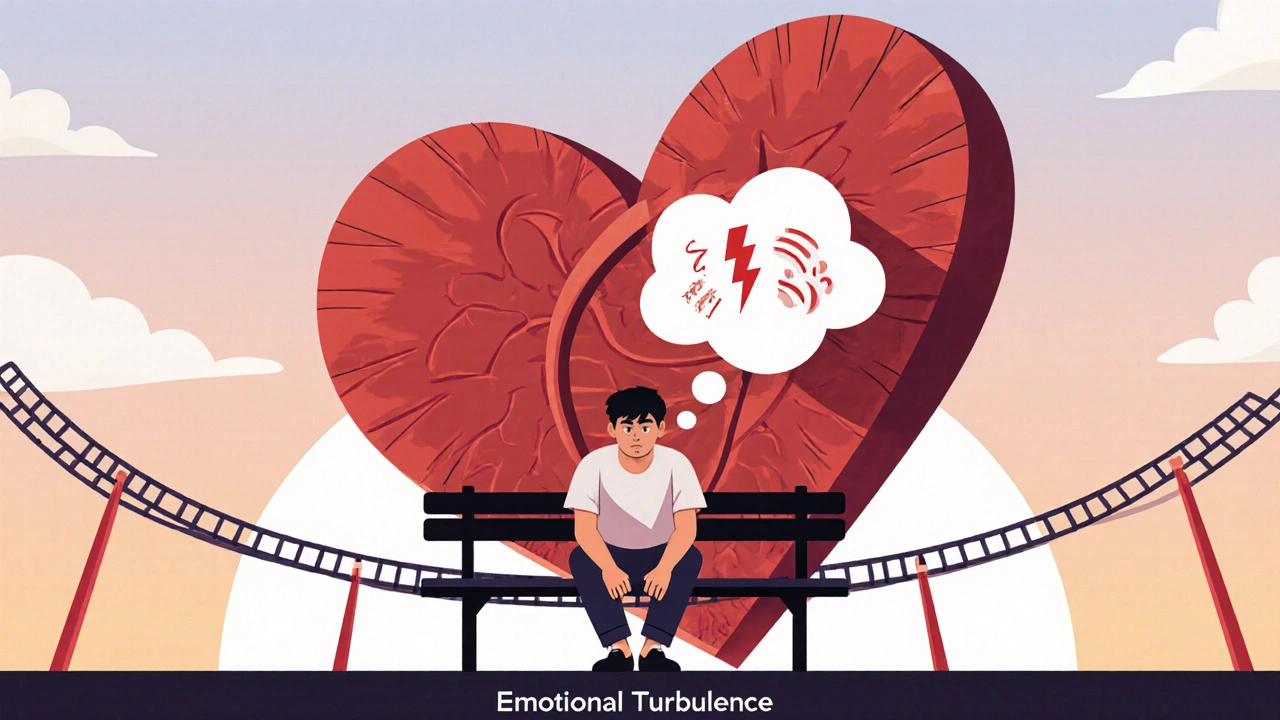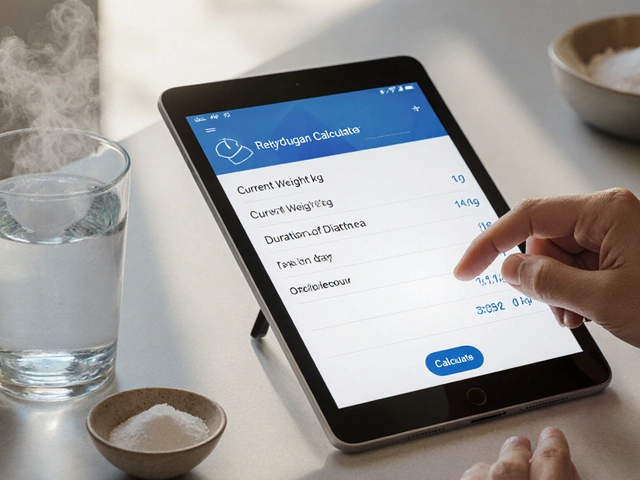
Hypertrophic Subaortic Stenosis is a form of obstructive cardiomyopathy where the heart muscle thickens near the outflow tract, making it harder for blood to leave the left ventricle. While the medical side gets a lot of attention, the emotional side often stays hidden. Living with a chronic heart condition can feel like an unpredictable roller‑coaster, and the mental toll can be just as serious as the physical symptoms.
Below you’ll find a practical roadmap to understand the feelings that come with Hypertrophic Subaortic Stenosis, learn proven coping tactics, and discover where to turn for help. Each section is built around real‑world experiences and expert‑backed advice, so you can start feeling a little more in control today.
Why Emotions Matter in HSS
Heart disease triggers a cascade of physiological reactions-elevated heart rate, adrenaline spikes, and fatigue. Those physical cues often feed the brain’s threat detection system, leading to anxiety, fear, or even depression. A 2023 study from the European Society of Cardiology reported that 38% of patients with hypertrophic cardiomyopathy (the broader category that includes HSS) experienced clinically significant anxiety, and 22% screened positive for depression. Ignoring these signals can worsen outcomes because stress hormones strain the heart further, and poor mental health reduces adherence to medication and lifestyle plans.
Common Emotional Reactions
- Fear of the unknown: Not knowing when symptoms might flare up can keep you on edge.
- Grief for loss of "normal": Activities you once loved-running, climbing stairs, even playing with kids-may now feel risky.
- Isolation: The condition is rare enough that friends and coworkers often don’t understand, leading to feelings of being alone.
- Frustration with medical jargon: Complex terms like "left ventricular outflow tract obstruction" can make you feel powerless.
- Guilt: Parents worry they’re burdening family members; partners fear they’re a liability.
Actionable Coping Strategies
Below is a step‑by‑step toolkit that blends self‑help methods with professional resources. Choose the pieces that fit your lifestyle and personality.
- Validate Your Feelings
Write down what you’re feeling each day. A simple journal entry-"I felt anxious before my doctor’s appointment"-helps you track triggers and shows your brain that you’re not dismissing the experience.
- Practice Grounding Techniques
When panic spikes, try the 5‑4‑3‑2‑1 method: name five things you see, four you can touch, three you hear, two you smell, and one you taste. Studies show grounding reduces sympathetic nervous system activity within minutes.
- Introduce Mindfulness or Meditation
Apps such as Headspace or Insight Timer offer guided sessions as short as five minutes. A 2022 meta‑analysis found mindfulness reduced heart‑related anxiety scores by 18% on average.
- Schedule Regular Physical Activity-Within Safe Limits
Low‑impact aerobics, gentle swimming, or stationary cycling keep the heart strong without over‑taxing the outflow tract. Always check with your cardiologist; many patients safely exercise 150 minutes per week.
- Build a Support Network
Lean on family, friends, and peers who truly get it. See the next section for ways to find them.
- Seek Professional Mental‑Health Help
Cognitive‑behavioral therapy (CBT) is the gold‑standard for chronic‑illness anxiety. If you’re overwhelmed, a therapist can help reframe catastrophic thoughts into manageable plans.
- Use Medication Wisely
In some cases, doctors prescribe low‑dose anxiolytics or antidepressants. Never self‑medicate; discuss risks, especially because certain drugs can affect heart rhythm.
Building a Support System
Human connection is a powerful antidote to fear. Below are specific avenues to consider.
- Patient Support Groups
Organizations like the Hypertrophic Cardiomyopathy Association (HCA) host monthly virtual meet‑ups. Sharing stories with people who face the same outflow‑tract challenges reduces loneliness by up to 30% (HCA 2024 member survey).
- Family Education Sessions
Ask your cardiology team to run a short briefing for your household. Understanding the condition helps relatives react calmly during symptom flare‑ups.
- Online Communities
Reddit’s r/HCM and Facebook groups such as "Living with Hypertrophic Cardiomyopathy" provide 24/7 peer advice. Look for moderators who are certified clinicians to keep information accurate.
- Professional Counseling
Licensed therapists with experience in chronic‑illness coping can guide you through grief, relationship strain, and identity shifts.
- Cardiac Rehabilitation Programs
Many hospitals run supervised rehab that blends exercise, education, and mental‑health coaching. Participants report a 22% improvement in quality‑of‑life scores.
When to Seek Professional Mental‑Health Care
Not every worry needs a therapist, but certain red flags merit prompt attention.
- Persistent sadness lasting more than two weeks.
- Thoughts of self‑harm or hopelessness.
- Severe panic attacks that interfere with daily tasks.
- Alcohol or drug use that feels like a coping shortcut.
If any of these sound familiar, contact a mental‑health professional right away. Many insurers cover telehealth CBT sessions, making it easier to get help from home.
Lifestyle Tweaks That Ease the Emotional Load
| Strategy | What It Does | Time Needed | Typical Cost | Best For |
|---|---|---|---|---|
| CBT | Reframes negative thoughts, builds problem‑solving skills | 1‑hour weekly | US$80‑120 per session (often covered) | High anxiety, catastrophic thinking |
| Mindfulness Meditation | Reduces sympathetic activation, improves heart‑rate variability | 5‑20min daily | Free‑to‑low (apps) | General stress, sleep issues |
| Peer Support Group | Provides shared experiences, reduces isolation | 1‑2hrs monthly | Usually free | Feeling alone, need practical tips |
| Cardiac Rehab | Combines safe exercise with education and counseling | 2‑3hrs weekly (3‑month program) | Covered by many health plans | Physical deconditioning, confidence rebuilding |
| Medication Review | Ensures psych meds don’t interfere with heart meds | 15‑30min each visit | Covered if prescribed | Complex medication regimens |
Quick Checklist for Daily Emotional Care
- ☐ Write a brief mood log each morning.
- ☐ Perform a 5‑minute grounding exercise before stressful events.
- ☐ Spend at least 10 minutes on mindfulness or deep‑breathing.
- ☐ Connect with a support person (friend, family, or peer group) at least once a week.
- ☐ Schedule any needed mental‑health appointments and keep a medication list up to date.
- ☐ Review activity levels; aim for safe, low‑impact exercise.
Resources You Can Trust
Here are a handful of reputable sources that regularly update guidance for HSS patients.
- American Heart Association - Hypertrophic Cardiomyopathy section.
- Hypertrophic Cardiomyopathy Association (HCA) - patient webinars and newsletters.
- European Society of Cardiology - clinical practice guidelines (2023 update).
- National Institute of Mental Health - anxiety and chronic illness fact sheets.
- Local hospital cardiac rehabilitation program directories.
Putting It All Together
Dealing with the emotional side of Hypertrophic Subaortic Stenosis isn’t a one‑size‑fits‑all journey. The key is to combine self‑awareness, practical coping tools, and a solid support network. Start small-pick one strategy from the list, try it for a week, and notice how you feel. Then layer on another technique. Over time you’ll build a personalized emotional‑health toolkit that keeps you steady, even when the heart surprises you.
Frequently Asked Questions
Can anxiety worsen my heart condition?
Yes. Chronic anxiety raises adrenaline and blood pressure, which can increase the pressure gradient across the narrowed outflow tract. Managing stress helps protect both the heart and overall wellbeing.
Are there support groups specifically for Hypertrophic Subaortic Stenosis?
While many groups focus on hypertrophic cardiomyopathy as a whole, several HCA chapters label themselves as “obstructive” or “subaortic” sub‑groups. Online platforms like HCA’s community forum let you filter by condition type.
Is medication for anxiety safe with my heart meds?
Only a cardiologist or psychiatrist who knows your full medication list can confirm safety. Some anxiolytics (e.g., certain benzodiazepines) can affect heart rhythm, so a tailored prescription is essential.
How often should I see a mental‑health professional?
If you’re just starting CBT, weekly sessions for 8‑12 weeks are typical. After that, monthly check‑ins or as‑needed appointments keep progress on track.
Can exercise make me feel less anxious?
Moderate aerobic activity boosts endorphins and lowers cortisol, which can calm nerves. Just stay within the safe limits set by your cardiologist to avoid over‑taxing the heart.
Write a comment
Your email address will not be published.





18 Comments
Really appreciate the thorough breakdown – it gives a clear roadmap for anyone feeling overwhelmed by HSS
I love how you’ve highlighted both the medical and emotional sides. It’s easy to overlook the anxiety component when the focus is on the heart itself. Adding a quick daily mood log, as you suggested, can also serve as a conversation starter with loved ones. Keep sharing resources like this – it builds community awareness.
Your checklist is thorough, but it borders on information overload for patients already stressed. Consider trimming down to essential actions.
Reading this felt like stepping into a whirlwind of hope and fear at the same time. The way you described the “roller‑coaster” of emotions really hit home for anyone living with HSS. It’s not just about the numbers on an echo; it’s about waking up each day wondering if your heart will let you climb the stairs. I’ve seen friends hide their panic behind a forced smile, only to crumble later when the symptoms flare. Your suggestion to journal each feeling is pure gold – putting words on paper can loosen the grip of anxiety. Grounding techniques like the 5‑4‑3‑2‑1 method sound simple but are surprisingly effective, especially in the moments before a doctor’s appointment. Mindfulness apps may feel gimmicky at first, yet the data you cited shows real reductions in heart‑related anxiety. Low‑impact exercise is another cornerstone; swimming, for instance, lets the body move without over‑pressuring the outflow tract. I also love the emphasis on peer support groups – sharing stories with people who truly understand cuts through the isolation. Family education sessions sound ideal; when your partner knows the warning signs, panic can be managed together. Cardiac rehab programs combine physical and emotional coaching, which is exactly what many patients need but rarely get. The medication review tip is crucial – mixing psych meds with cardiac drugs without oversight can be dangerous. Lastly, your quick checklist at the end reads like a daily mantra that can anchor someone amid chaos. Keep updating this guide as new research emerges; the community will thank you. Overall, this is a heartfelt and practical toolkit that many will lean on for years to come.
Great guide! I’d add that tracking your heart rate during exercise can help you stay within safe zones. Many patients find a simple smartwatch useful for quick checks. Also, don’t underestimate the power of a regular sleep schedule – good rest lowers overall stress and supports heart health.
The compendium presented herein admirably integrates psychosomatic considerations with cardiological praxis. Nonetheless, one might contend that the discourse could benefit from a more rigorous exposition of the neuroendocrine pathways implicated in anxiety‑induced hemodynamic perturbations. Future iterations would do well to incorporate such mechanistic elucidations.
It is commendable how this article bridges clinical expertise with compassionate counsel; the inclusion of mindfulness practices resonates deeply across cultural paradigms. In Indian contexts, the practice of pranayama offers an accessible adjunct to the grounding techniques described, harmonizing breath with cardiac rhythm. Moreover, community support through local cardiac societies can reinforce the virtual peer groups mentioned, fostering a sense of collective resilience.
I’ve been where the anxiety feels like a second heartbeat, so the grounding tip really helped me stay present during a flare‑up. Pair it with a short walk in fresh air and you’ll notice the tension easing faster than you expect. Keep experimenting with what fits your routine – consistency beats perfection.
Surely the pharma industry isn’t pushing these “mind‑calming” apps just to sell more meds?
While the advice is well‑intentioned, it borders on platitude; a mere smartwatch does not substitute for nuanced clinical monitoring. 🎭
For anyone starting out, I recommend the “HCM Support” subreddit for daily tips – the community often shares printable mood‑tracking sheets that are easy to use. 😊
The article contains several grammatical oversights, such as misuse of “its” versus “it’s”, which undermines its professional credibility.
Picture this: a calm lake at sunrise, each ripple representing a breath you take during meditation – that visual can anchor you when panic rises.
One could argue that the emphasis on CBT, while valuable, may inadvertently sideline other therapeutic modalities such as acceptance and commitment therapy (ACT), which some research suggests can be equally efficacious for chronic illness anxiety; moreover, the insistence on structured weekly sessions might not accommodate patients with erratic schedules due to fluctuating symptom severity, thereby necessitating a more flexible, patient‑centred approach that integrates telehealth options and self‑guided resources.
Frankly, the guide feels like a glossy PR brochure rather than a grounded medical document, glossing over the sobering reality that many patients still lack access to affordable mental‑health services; the suggestion to “seek professional help” seems naive when insurance barriers persist, and the proposed “monthly check‑ins” are a luxury many cannot afford.
Love the positivity! Just a tiny heads‑up – “definitely” was misspelled later on, but overall the vibe is uplifting and motivating.
While the compendium is exhaustive, its reliance on buzzwords like “synergistic” and “holistic” borders on hyperbole, potentially diluting the actionable content for lay readers.
Great job – grateful for the practical tips and will definitely share this with my support group.